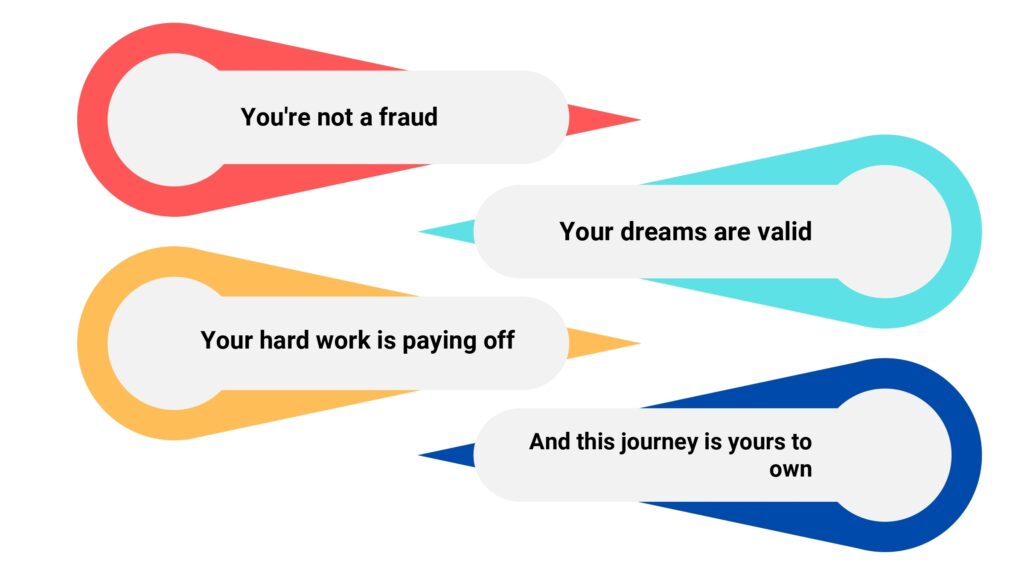“What if I’m not actually good enough?”
You’ve been putting in the hours. The late nights. The mock tests. The sacrifices. And yet… one bad score, one low-confidence moment, and that voice creeps in:
“Maybe I’m just lucky. Maybe I don’t really belong here.” Sound familiar? If it does, you’re not alone.
In fact, up to 82% of people experience Impostor Syndrome at some point in their lives. Yes, even toppers, lawyers, and judges.
Let’s talk about this; Honestly.
Impostor Syndrome: The Hidden Burden of Judiciary Aspirants

Impostor Syndrome isn’t just self-doubt, it’s the persistent feeling that you’re a fraud, that your achievements are a fluke, and that sooner or later, someone will “find out.”
And in the world of judiciary prep, with sky-high expectations, pressure to outperform, and endless comparison, it hits even harder.
You might:
- Downplay your hard work
- Question your intelligence after a single bad mock
- Feel isolated, despite being surrounded by fellow aspirants
- Dismiss your progress and obsess over your flaws
But here’s the truth: You’re not broken. You’re just human.
Fear of Failure Feeds the Fire
Judiciary prep is intense. The stakes are high. When failure feels like the end of the world, Impostor Syndrome thrives. But guess what? You’re allowed to stumble. You’re allowed to mess up. And you’re definitely allowed to bounce back.
The goal isn’t perfection, It’s progress.
Let’s Break Free Together
Here’s how you can fight the fraud feeling and start believing in yourself again:
1. Practice Radical Self-Compassion
Beating yourself up after a failure won’t make you better, it’ll burn you out. Instead, speak to yourself like you would to a struggling friend. Swap:
“I’m the dumbest one here.” For: “I’m learning. I’ve come far. I just need to recalibrate.” Kindness is power. And you deserve your own compassion.
2. Celebrate Your Wins (Big and Small)
You’ve come a long way, don’t let one slip-up erase that.
- Print out your certificate of completion from that tough course
- Put a sticky note on your mirror with your proudest milestone
- Keep a folder titled “Proof I Can Do This” on your phone
When self-doubt creeps in, these reminders will silence it.
3. Reassess, Don’t Regress
One bad exam doesn’t mean you’re incapable, it may just mean your strategy needs a tweak.
Try:
- A new revision technique
- Breaking long study hours into Pomodoro sessions
- Using tools like Trello, Notion, or Google Calendar for better structure
Study smarter, not harder. You don’t need to suffer to succeed.
4. Lean Into Your Tribe
Don’t isolate yourself in your struggle. Reach out. Speak up. Let your friends, mentors, or therapists be your support system. At Edzorb, we believe in community over competition. You’re not alone in this.
5. Try Again
Fall down seven times, stand up eight. Failure isn’t your enemy, it’s your teacher. It shows you where to grow. It gives you grit. It builds character. You’re allowed to feel low. But don’t stay there. Dust off, refocus, and move forward.
You Belong Here. You Are Enough.

Let this be your reminder:
- You’re not a fraud
- Your dreams are valid
- Your hard work is paying off
- And this journey is yours to own
Impostor Syndrome may whisper in your ear, but you get to choose whether you believe it. At Edzorb, we’ve got your back. Through every stumble, every success, and every moment of doubt, you’re never walking alone.
Need a dose of motivation or just someone who gets it?
📲 Tap Here to connect with the Edzorb Law community
✨ Let’s grow through what we go through, together.

 Podcast
Podcast








 Features
Features






